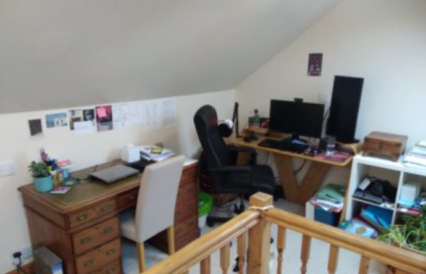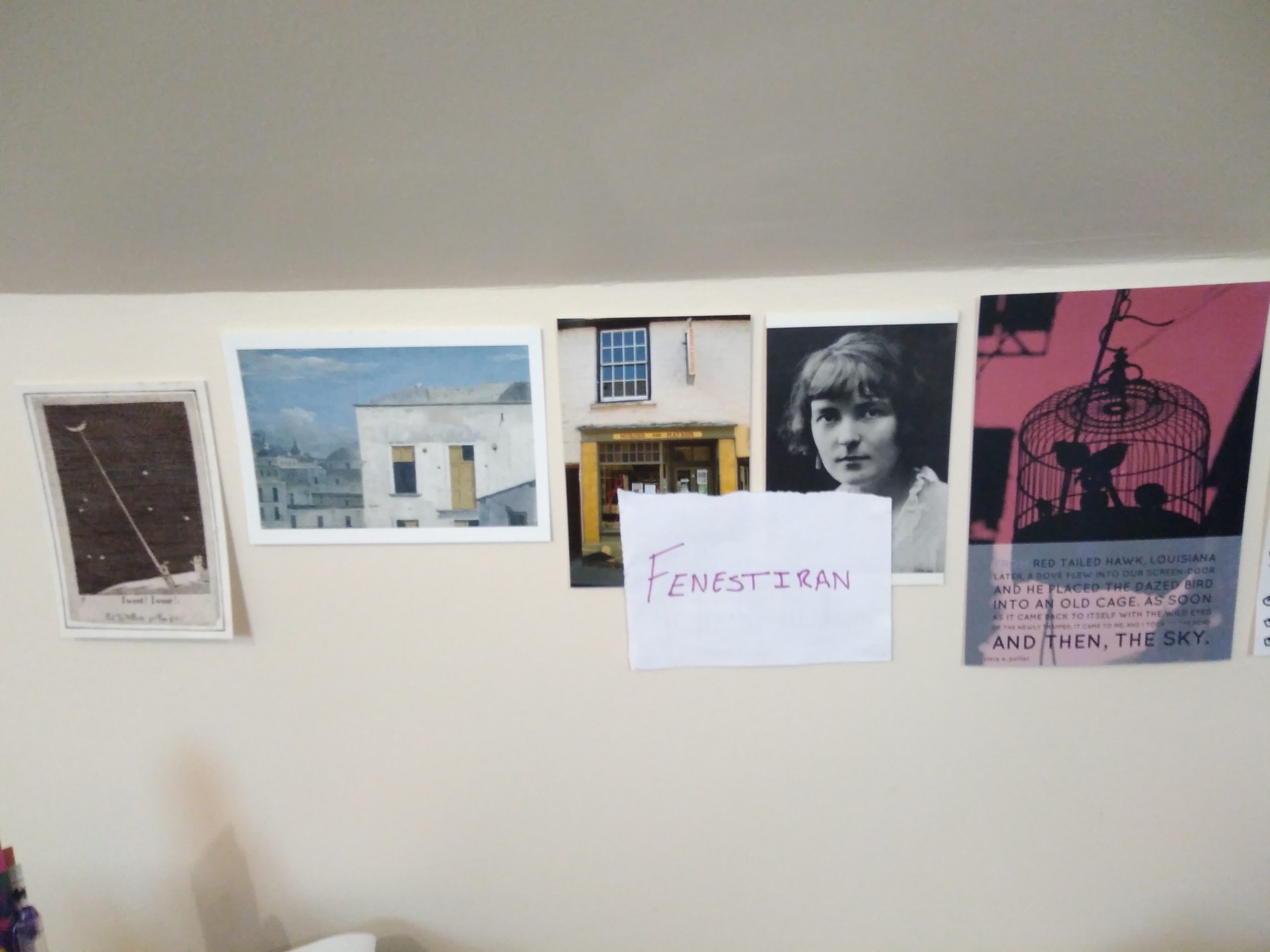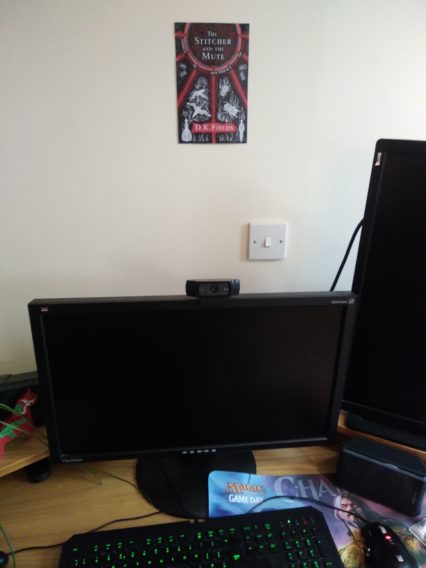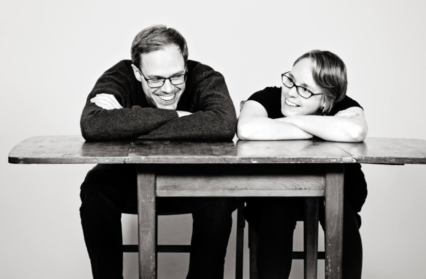DK Fields is the writing partnership of novelists David Towsey and Katherine Stansfield. Today they give us a tour of their creative space as part of our Writers’ Rooms series. The couple are originally from south west England and now live in Cardiff. Widow’s Welcome, the first in the political fantasy trilogy Tales of Fenest, is out now. David is the author of the zombie-western The Walkin’ Trilogy. Katherine writes the historical crime fiction series Cornish Mysteries and is also a poet.

Kath: Given that Dave and I jointly created a new fictional world for our fantasy series The Tales of Fenest, it would seem to make perfect sense for us to share a physical writing space in which to write the rest of the series. And most of the time it does make sense.
As we’ve been working on the second and third books in the trilogy, one or other of us regularly interrupts the other with questions along the lines of: ‘Remind me what we decided to do about the police uniforms in the end?’, ‘Where did we say the inn was?’, ‘Is there a forest there?’ as well as variations on ‘did we re-name / kill / cut / change the gender of that character?’. It can be very handy to have your co-writer sitting next to you for just this sort of mental block about your own fictional creation. How often we say, ‘I know I should know this, but . . .’
The set-up of the room reflects this closeness of this collaboration. We share the converted loft with our desks right next to each other: mine is the old-looking one on the left and Dave’s is the more modern one directly ahead. My desk belonged to my granddad and I remember seeing it in his house in north Cornwall when I was a child. But only seeing it, from the doorway of the study. My sister and I weren’t allowed in there. That word, ‘study’ – it meant seriousness, quiet, no asking of questions. A room for grown-ups, full of grown-up signs of importance: this leather-topped desk, a blotting pad and ink well, leather-clad books, leafy plants in bronze-ish pots, a glass-paperweight for holding down all those important papers grown-ups accumulate. I never saw anyone use that room. It was for show, and everything in it seemed from another age: brown and vaguely Edwardian – not that I would have been able to frame it that way as a ten-year-old, despite the amount of historical drama I watched on tv.
But it turns out that my ‘vaguely’ sense was right, because all my granddad’s ‘old’ stuff was 1960s replicas, including this desk. It’s a fake, which seems more than a little appropriate for a writer to use for fiction-making. For this writer, the new home of the desk is in no way a deathlike ‘study’ as my granddad’s room was. Our writing room is a place of life and noise and question after question. Would you like a cup of tea? What are we having for lunch? How many words have you written today? Shall we sack it off and get ice cream?
My desk drawers are crammed with stationary supplies of which, by dint of where they’re stored, I am in charge: the K of D. K. Fields is the supply monitor of this outfit. There is also lots of redundant electrical junk we should sort out but don’t because the drawer will still close, for now. The space for a chair is far too narrow for any sensible ergonomic desk chairs; I use a very cheap dining chair, part of a set which came free with our dining table. It’s the only thing that fits, but surprisingly I have yet to have back problems despite the lack of any lumber support. This feels like some kind of miracle – the kind in short supply with the graft of writing.
Dave’s chair is enormous. He tends to lean back when he’s writing and sometimes comes dangerously close to landing on me – sharing a writing space isn’t so good in those moments. We have other differences in working too: Dave listens to music when he writes, while I can’t bear any noise other than the ambient sounds of the house. So, compromise: Dave wears headphones while he works at his PC. I use a battered laptop on its last legs which seems to find this room a challenge. The loft has two skylights which let in a tremendous amount of sun; for part of the afternoons, the sun shines directly on me and the laptop. We both get too hot and after a certain point, the laptop will overheat and randomly conk out. I tend to squawk when that happens, which gives Dave a heart attack and he wrenches off his headphones. We have a fan for when the heat gets unbearable, but that tends to disturb all the loose paper which flies around the room. We keep saying we’re going to tidy up, put some kind of system in place. But we don’t. We have deadlines. We have questions. Shall I bring in the plants to over-winter? Have you read my scene yet? Are you making the tea?
At the desk I write novels and do all other work business: emails, teaching prep, marking, blog posts, social media, the lot. The only thing I can’t do here is write poems. I have to go downstairs to the dining table for that, and I have to write long-hand. I’m not quite sure why. Something to do with space? But I could move the laptop. Maybe I need to be on my own for that, or in a room that isn’t for writing. If I think about it, I do tend to write poems on the hoof, but novel-writing has to be from more of a fixed point. This point, this room, has worked well the last few years.
Dave is not a fan of clutter, but I thrive amidst it, hence all the stuff stuck on the wall by my desk: key teaching dates for different courses; lines from a poem by clare e. potter about not getting trapped; a picture of Katherine Mansfield – gift from another friend in recognition of how often my name gets mixed up with my almost name-same; a postcard of one of Thomas Jones’ Italian studies – my favourite painting, which I would like to write about one day; and a note from Dave which has the correct spelling of Fenestiran. This is the word to describe the people of Fenest, capital of our made-up world, which I have consistently misspelt since we began working on the project in 2015. He finally grew tired of my question, ‘How do we spell that again?’

Dave: Kath is, as ever, a hard act to follow. But over the years, I’ve had a fair bit of practice of doing just that. When we first met, Kath was a year ahead of me on the same BA in English & Creative Writing. She finished her MA and PhD, with me following a few years behind. If you’ve seen us out and about, at book events in Cardiff and the like, chances are Kath will be leading the charge and I’m a step behind, smiling politely (think Homer Simpson when he meets Billy Corgan. Do Simpsons references still land these days?). I think it’s partly the height difference between us: I’m a lanky 6’6” and Kath is, as she likes to put it, 5’-nuthin’. If Kath goes first you can see both of us at the same time. You get a two-for-one at a quick glance. The whole unit. The whole D. K. Fields package.
But publishing novels is perhaps where we, utterly serendipitously, became more “professionally” in sync. Our first novels, Kath’s The Visitor and my Your Brother’s Blood, were published within days of each other, despite being with different publishers and signed at different times. The books that followed continued to mirror each other, not just in timings but occasionally in themes or even – gasp – actual scenes. ‘You realise I killed a pig in my last book, don’t you?’ was something I actually had to say once, reading an early draft of Kath’s vivid pig-sticking scene in Falling Creatures. The crossovers became silly once we started looking for them. So, co-writing seemed inevitable. But we didn’t really start sharing a writing space until we moved to Cardiff, and not a designated office until we moved to this house (we both wrote on a table in the lounge of our first flat in Cardiff. We played a lot of board games on that table too).
When thinking about what to write for this post, and after reading Kath’s part of it – she wrote her part first, obviously – I remembered one of the very few short stories I’ve managed to publish, thanks to The Future Fire magazine. It’s an SF short about, appropriately, a society sharing limited physical space and contains the line: ‘Share your space today, so we can have a more expansive tomorrow’.
I like to think that’s what we’re doing, every time I lean back in my big faux-leather office chair and clunk Kath on the shoulder. Or whenever Kath sticks an inspirational-something to the wall above my monitor; right now I have a print-out of the cover of The Stitcher and the Mute, the second D.K. Fields book, staring down at me, reminding me I should be writing the third book. We’re sharing this space today, for a more expansive tomorrow.
‘All right,’ I hear you say, ‘enough of this wishy-washy self-reflection pillow talk. Get to the good bit: why is one of your PC monitors turned a funny way?’
This never fails to shock people who get the full house tour up to the loft.
It’s then I realise we have a lot of friends who aren’t so hot on tech or computers. A lot of friends who are creative types, basically, who see their laptop as a necessary evil – emphasis on the evil.
To me a second monitor is essential. I get all fidgety when I have to work at just a single screen. It’s like I’m missing a limb. Okay, it’s not that extreme, but it’s sort of close. I keep pushing the mouse to the edge of the screen, expecting to hop over to where I have another Word doc or webpage open, my emails or Spotify. The whole portrait orientation of my second monitor, which seems such a revelation for some, is simply a space-saving solution. The desk I bought on sale online, from a reputable source but without having seen it, can’t handle two landscape monitors of decent size.
Really, it’s a fantastic, silly desk. All these artsy curves and Vs that have no sensible use to them. It has no story, no history (fake or otherwise) like Kath’s desk. Instead, it has pretensions of the future, like a ship’s console from a low budget SF show.

That vibe certainly helps with my desk’s other main purpose: computer games. Not just the playing of games – which, admittedly, I do my fair share of – but the making of them. I’m one half of the Bafta Cymru-nominated Pill Bug Interactive, an indie games studio. We’ve released two games so far, Intelligent Design and Cycle 28, on PC and Nintendo Switch and we’re working on our third, Making it Home. As well as writing for the games, I do a good share of the game design, marketing, and pixel art. As a studio, we work a lot over Discord (it’s like Skype but for gamers who don’t want their grandparents calling them all the time). Hence the webcam and the not quite top of the line snowball microphone. I also stream games weekly from this desk. You can find us live every Tuesday, 8pm, on YouTube, Twitch, Facebook, and Twitter. When I’m on camera, you get to see live pictures of this very office. It’s wild…
It also means Kath flees the office for the safety of downstairs every Tuesday night. I have no idea what she does down there. I assume she’s writing poems. Because despite being a unit for over fifteen years, despite being the hivemind that is D.K. Fields, despite sharing eight-square feet to do all this damn writing, an “expansive tomorrow” has to have space for us to be ourselves. Space for Kath to not play computer games, space for me not to write poems, and space for fake-old and silly SF desks. Space for sharing.
Widow’s Welcome by D.K. Fields is out now with Head of Zeus.
DK Fields’ Writers’ Room piece is a part of a Wales Arts Review series.












